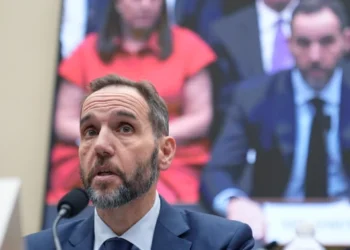Ahead of today’s start of the three-day U.S.-Africa Leaders Summit, Deputy Commerce Secretary, Don Graves acknowledged that the U.S. has fallen behind as China has surged past American foreign direct investment in Africa but argued that the U.S. remains the “partner of choice” in Africa.
At an event hosted by Semafor, Graves noted, “We took our eye off the ball so to speak, and U.S. investors and companies are having to play catch up.”
“We’re bringing the best technologies and innovations, the highest standards… The U.S. helps to build capacity in our partner countries as opposed to exploiting those countries.”
Don Graves
Heads of states from 49 African nations and the African Union have been invited to take part in the summit that has been publicized as an opportunity for President Joe Biden’s administration to re-engage the continent’s leaders.
The continent, whose leaders often feel they have been given short shrift by leading economies, remains indispensable to global powers because of its rapidly growing population, significant natural resources, and a sizable voting bloc in the United Nations.
Africa remains of great strategic importance as the U.S. recalibrates its foreign policy with greater focus on China; what the Biden administration sees as the United States’ most significant economic and military adversary.
Even before the summit officially began, the White House announced Biden’s support for the African Union becoming a permanent member of the Group of 20 nations and that it had appointed Johnnie Carson, a well-regarded veteran diplomat, to serve as point person for implementing initiatives that come out of the summit.
White House National Security Adviser, Jake Sullivan, on Monday, December 12, 2022 opined that the administration would commit to spending $55 billion in Africa over the next three years on “a wide range of sectors to tackle the core challenges of our time.”
“If you compare what the United States is committing over the next three years to what any other country is committing, I think we stack up extremely favorably.”
Jake Sullivan
Even though the Biden administration has tried to minimize concerns about China’s deepening presence on the African continent as a driving force at this week’s talks, Beijing’s shadow over the biggest international gathering in Washington since the start of the pandemic nearly three years ago looms large.
Without direct mention of China, Deputy Treasury Secretary, Wally Adeyemo, sounded the alarm about petering private investment in middle- and low-income countries, particularly in Africa.
The infrastructure finance gap, or money needed for essential projects like lighting homes and businesses, responding to the COVID pandemic and to making communities resilient against extreme weather, sits at $68 billion to $108 billion per year, Adeyemo intoned.
Trade between the U.S. and sub-Saharan Africa was $44.9 billion last year, a 22% increase from 2019 but foreign direct investment into the region fell by 5.3% to $30.31 billion in 2021.
On the other hand, trade between Africa and China surged to $254 billion last year, up about 35% as Chinese exports increased on the continent.
Chinese Ambassador Opposes Chinese Debt Trap Notion
On Monday, December 12, 2022, China’s ambassador to the U.S., Qin Gang, pushed back against the Chinese debt trap notion and made the case that China has long been “sincere” in approaching Africa as the vibrant emerging market of the future.
“We are not interested in the views of any other countries on China’s role in Africa,” Qin disclosed at the Semafor forum.
Commenting on whether Biden administration officials would directly approach U.S. concerns about Chinese involvement in Africa during this week’s meetings, officials bristled.
“It’s not going to be about China. It’s going to be about Africa,” White House Press Secretary, Karine Jean-Pierre divulged.
However, the Pentagon has acknowledged that China’s increasing efforts to set up military bases in Africa and forge stronger economic ties across the continent fuel U.S. security concerns that will limit how much the America’s military can work with countries that have growing ties to Beijing.
Officials said that while America can’t and won’t tell African countries to turn away from China, the administration is making it clear that allowing Chinese bases on their soil and using Chinese telecom systems could hurt U.S. military relations with them.
READ ALSO: Government Has Implemented Many Policies To Complement In The Fight Against Corruption – Dr Bawumia






















